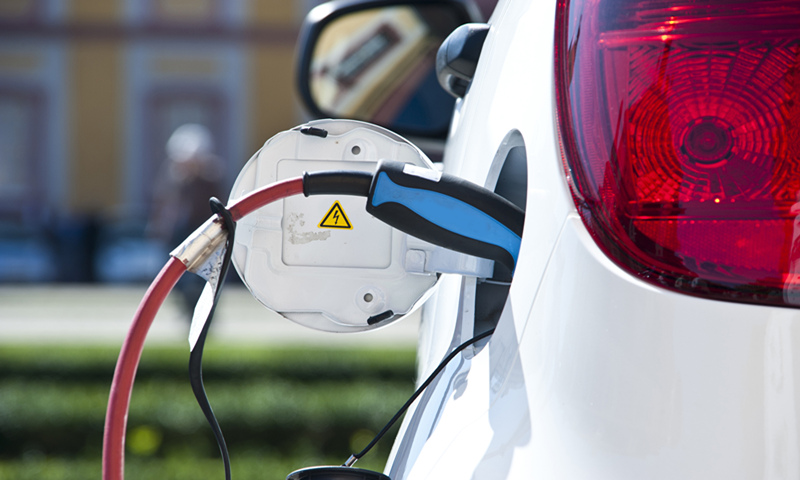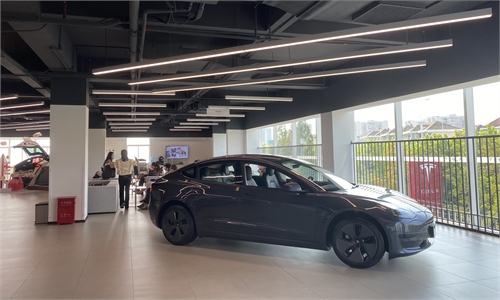China vows to strengthen global cooperation on NEV, even as US pushes for decouple
Open attitude reaffirmed, even as US pushes for decouple

A NEV is charging. Photo: VCG
Chinese Premier Li Keqiang has reaffirmed China's open attitude toward global cooperation in the new-energy vehicle (NEV) sector and vowed to treat all NEV companies registered in China equally, sending a strong signal about an open, thriving Chinese NEV market to global carmakers amid growing uncertainties over disruptions to global supply chains and geopolitical risks.China's continued efforts to further open up its domestic NEV market, the fastest-growing one in the world, comes as the US pushes for a decouple in the sector, with a new legislation reportedly aiming to "break China's hold on battery supply chains," analysts noted on Sunday, stressing that such efforts are conducive to development of the NEV sector in China and around the world.
In a congratulatory letter to the 2022 World New Energy Vehicle Congress, Premier Li said that China's supportive policies for the NEV industry are in line with international rules, and China makes no exception for NEV companies registered in China, the Xinhua News Agency reported on Saturday.
China will continue to deepen NEV-related global cooperation with an open attitude, and seek development via cooperation in order to achieve a mutually beneficial and win-win situation, the letter read.
The letter also stressed that China's NEV industry has entered a "comprehensive market expansion period," as China is a powerhouse not only in car production, but also in car consumption.
Experts noted that China's NEV cooperation with other countries lies in several fields. First, there is a large number of Chinese NEV startups selling cars in other countries, especially in Europe, while overseas car companies are also targeting China's huge market for manufacturing and selling their products, including traditional brands like Mercedes-Benz, Ford and electric car companies like Tesla.
For foreign carmakers, no other market in the world can provide the same level of scale as China. In the US, for example, their subsidy policy for NEV cars is currently stronger than China's, but their market scale still lags behind China's as a result of its lower population base, Zhang Xiang, a research fellow at the Research Center of Automobile Industry Innovation of the North China University of Technology, told the Global Times on Sunday.
This means that China is one of the few markets in which NEV brands can achieve huge success in a relatively short time. Tesla, for example, managed to sell about 400,000 Chinese-made cars in China last year, only about three years after it built a local plant in China.
Linda Gong, general manager of Tesla China Shanghai Region, also told the Global Times recently that the company "is very confident about the Chinese market," as it sees that China is speeding up its pace of opening-up, while China's business environment has also improved.
By the end of 2021, a total of about 16 million NEVs were sold globally, with China accounts for more than 50 percent of global NEV sales, according to data from the Xinhua News Agency.
Apart from sales of cars, trade of NEV parts is another sector of cooperation between China and other countries, experts noted.
According to Zhang, China still needs to import many core NEV parts such as automobile brake systems and safety air bags from abroad, while overseas companies like Nvidia and Qualcomm also provide NEV chips for electric cars sold in China.
"So far, about 95 percent of China's NEV chips are still imported," Zhang said.
On the other hand, China has achieved great progress and success in NEV batteries, which also supply overseas markets. For example, Chinese NEV battery maker CATL has topped global companies in terms of battery shipment for five consecutive years, Zhang said.
With China's NEV industry continuing to rise further backed by Chinese companies' maturing and overseas carmakers' market entrance, the NEV industry would play a "strategic" role in driving China's consumption market in a period of economic downward pressure, experts said.
According to data calculated by Chen Jia, an independent research fellow on international strategy, China's NEV consumption came to about 1.6 trillion yuan ($233 billion) in 2021, while driving up upper and down stream industrial value by about 4.8 trillion yuan, accounting for more than 10 percent of China's total consumer goods retail in total.
In 2021, China's total retail sales of consumer goods reached 44 trillion yuan, data released by the National Bureau of Statistics showed.
"The NEV industry has truly become a pillar emerging industry in China," Chen told the Global Times on Sunday.
According to a report from domestic news website cls.cn, during the 2022 Chengdu Motor Show, which opened on Friday in Chengdu, oil-fuelled cars could hardly be seen at the stands of domestic car companies, as plug-in hybrid and hybrid car models took the lead.


